MO Interview: Yamaha Roadracing Champion Rich Oliver
It’s probably an unfair thing to think, but a lot of people blamed Rich Oliver for the AMA dropping the 250 class from the program after the 2003 season. Watching the five-time 250 champ win on his TZ250 screamer was about as dependable as the sunrise, both things similarly glorious. In that final year, RO not only won every race, he led every lap. He’d won every 250 race in 1996 and ’97, too, before taking two years off to ride Yamaha factory Superbikes and 600 Supersports in ’97 and ’98, at a time when the AMA was packed like a sardine can with world-class riders capable of winning the odd World Superbike race (one Anthony Gobert, at Laguna Seca).
“Consummate professional” is the cliche, and Rich defined it with meticulous preparation – actual engineering, even – and a rock solid work ethic. He also had no trouble being slightly unprofessional when that was called for, on at least a couple of memorable Yamaha junkets. Good times…
JB for MO: Rich, I’m going to ask you the question I’ve been asking all the Yama-champions. Can you look back and pick one day, the best day you ever had on a motorcycle?
Rich Oliver: Oh, that’s so hard, there are so many different experiences, both good and bad, that are so memorable. And every decade, you’re such a different person by the time you reach that next milestone, that next thing hits you in a different way. Probably one of the biggest moments for me was when I rode for Kenny Roberts. I think the year was ’89 or ’90, I think ’89, and Kenny said I could go to Spain and race in the Superprestigio event, on John Kocinski’s spare factory 250. So, there I am, a kid from California coming up through the AFM, super poor, working out of the back of an old Datsun 510 and a U-Haul trailer … to get to ride a world championship bike in a foreign country was a pretty big milestone for me.
It helped me so much in my future 250 racing, because I got to feel what a 250 Grand Prix bike could really do. In those days it was Michelin, and there were C, B and A-grade tires. John [Kocinski] of course got the A-grade. They started me out on Cs, and it handled well and chattered a little bit, and did things I was used to. Then I worked up to the Bs, and they were better. Finally, Kenny stormed over there and got me the A tires – and every bump on the track disappeared and there was unlimited traction, and you could really do no wrong, and I was ‘Oh. So, that’s how you do it…’
So, that was a great milestone, one of my earlier ones. And then, at the end of my career, in I think my final season with Yamaha on the 250 when I won all the races … I think the last race of the year was at Barber. Riding that final segment of, the last five or six laps, I had a big lead and I was just thinking about, well, about everything that had got me there. It was the last 250 race ever run by the AMA.
JB: You’d been super-dominant in that class for like ten years.
RO: So, it was kind of a bittersweet moment, but I really remember savoring the ability that bike had given me, the way I’d learned to ride it over the years. That was another big milestone.
Since then, I really haven’t raced much. I raced a few years after that at Willow Springs, doing the “outlaw” 250 races for money once a year … but when those stopped, I stopped. I’ve been doing the Mystery School ever since. So, I ride a lot still; I just don’t get to ride roadracers as much as I used to.
JB: Okay, what was your worst day?
RO: I have a few, that have grown more important in my older (sarcasm) years. One of the big crashes I had was during a World Superbike race, riding a Yamaha, I got caught up in a starting accident very similar to the unfortunate one that just took those two young riders’ lives at Laguna. We ended up in the same place in the gravel, I was knocked out, completely unconscious, woke up what felt like much later. Fortunately, I just had a severe concussion, so I consider myself quite lucky. But now, some of those heavy concussions have cost me some long-term memories. My wife will say I’m a little, ah, spacy, from time to time. Some of those things you don’t feel right away. Then later, as you age, you feel the aches and pains and the lack of skills that you might have had earlier.
JB: I’ll go on record and admit I’ve experienced a lot of the same problems, and I’ve never even had a concussion. That I can remember? So…
RO: Some of it may be simply aging. Some of my injuries, those nag me today. But I don’t feel too bad about the orthopedic stuff … the brain, that’s the stuff that you wish you could undo. I rode with Shoei for many many years, and I tell you what, that thing protected me, and it’s why I’m here today. [My injuries] are my only regrets.
JB: Have you found anything to replace racing, and winning races? I know you were doing art, and painting.
RO: Yeah, that’s a little different. There were many things I wasn’t able to experience when I was racing full-time, that I try to do more of now. I try to do some artistic things, I try to find out a little more about what’s going on in the world around me. When I was racing, I was so focussed, which is how you have to be, that’s all there was.
Now, I enjoy small business, being self-employed, being an entrepreneur – creating an environment for people to ride and improve their skills. But I tell you, nothing, ever, is going to replace that feeling of competition, because … you can watch it on TV, hear people talk about it, but in my case, it was absolutely going to battle, it was war, just brutal war, and I put everything I had out there on the track. You can’t really do that in normal society, you’ll generally wind up locked up. It was a good outlet for my aggression. Now I don’t have that. Good thing I’m older, it’s not so important anymore.
Rich’s laughter rings slightly hollow. I think he’d be back out there tomorrow given the chance. I’d watch. In the meantime, there aren’t many better ways to sharpen your skills than a day or four at the Mystery School…
More by John Burns



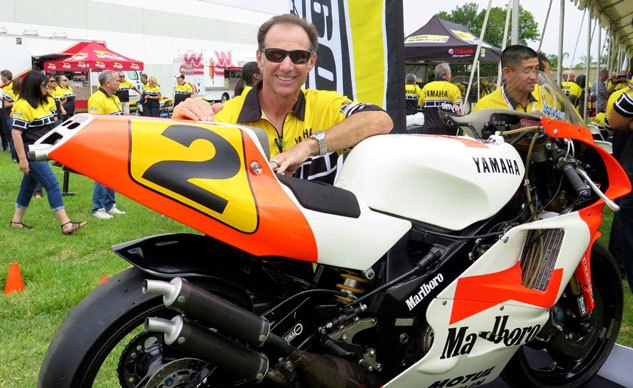
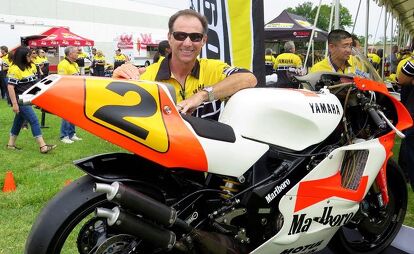








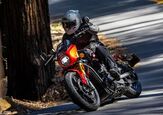
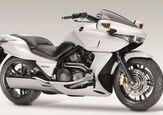
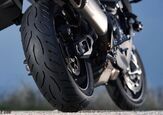
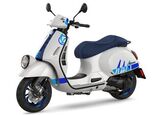
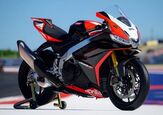
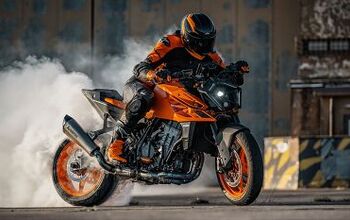
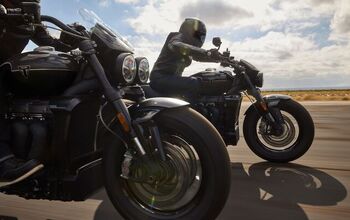

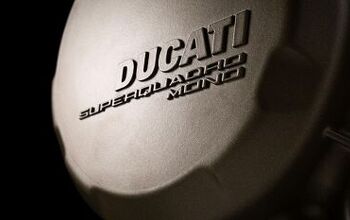
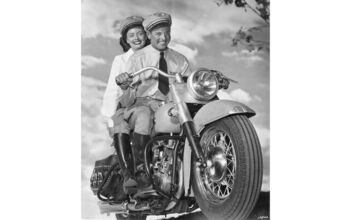
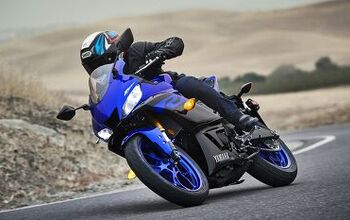
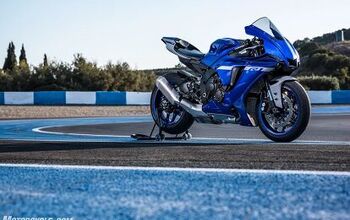
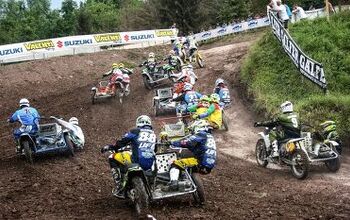

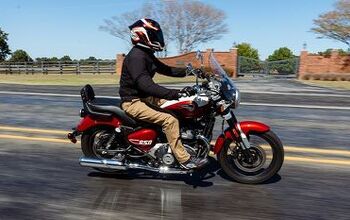
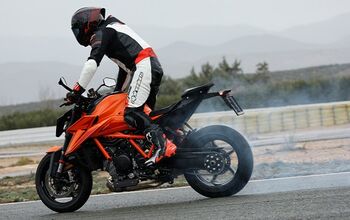
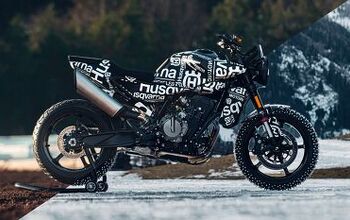

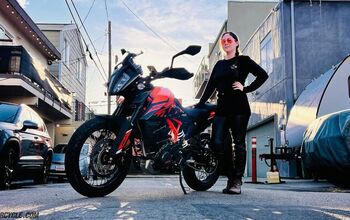

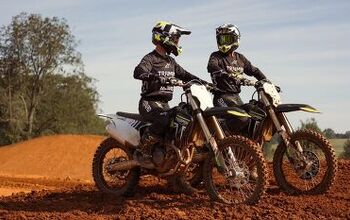
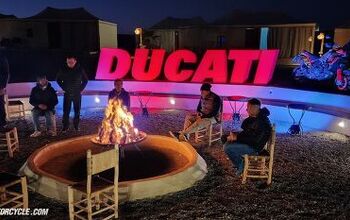
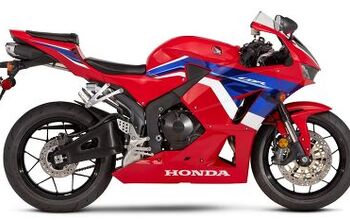
Comments
Join the conversation
JB,
My thanks with one question - was Rich's 'TZ-250' Parallel or later V-Twin powered?
"But I tell you, nothing, ever, is going to replace that feeling of competition, because … you can watch it on TV, hear people talk about it, but in my case, it was absolutely going to battle, it was war, just brutal war, and I put everything I had out there on the track. You can’t really do that in normal society, you’ll generally wind up locked up. It was a good outlet for my aggression. Now I don’t have that. Good thing I’m older, it’s not so important anymore".
This is solid gold. Excellent interview and subject!